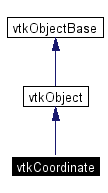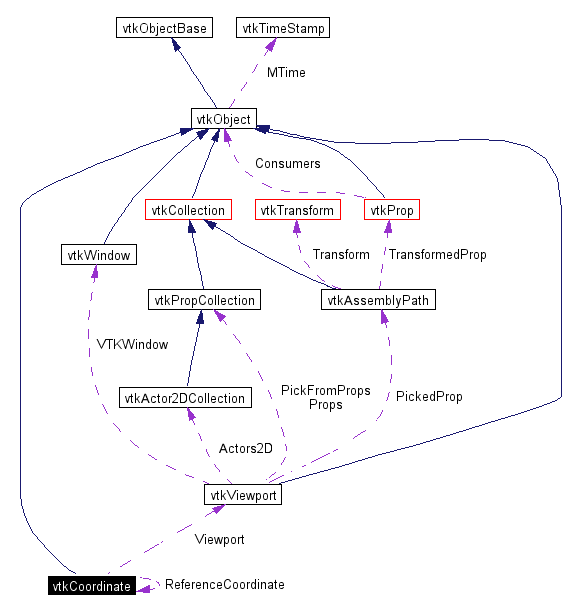vtkCoordinate Class Reference
#include <vtkCoordinate.h>
Inheritance diagram for vtkCoordinate:
 [legend]
[legend]Collaboration diagram for vtkCoordinate:
 [legend]List of all members.
[legend]List of all members.
Detailed Description
perform coordinate transformation, and represent position, in a variety of vtk coordinate systems
vtkCoordinate represents position in a variety of coordinate systems, and converts position to other coordinate systems. It also supports relative positioning, so you can create a cascade of vtkCoordinate objects (no loops please!) that refer to each other. The typical usage of this object is to set the coordinate system in which to represent a position (e.g., SetCoordinateSystemToNormalizedDisplay()), set the value of the coordinate (e.g., SetValue()), and then invoke the appropriate method to convert to another coordinate system (e.g., GetComputedWorldValue()).
The coordinate systems in vtk are as follows:
DISPLAY - x-y pixel values in window
NORMALIZED DISPLAY - x-y (0,1) normalized values
VIEWPORT - x-y pixel values in viewport
NORMALIZED VIEWPORT - x-y (0,1) normalized value in viewport
VIEW - x-y-z (-1,1) values in camera coordinates. (z is depth)
WORLD - x-y-z global coordinate values
USERDEFINED - x-y-z in User defined space
If you cascade vtkCoordinate objects, you refer to another vtkCoordinate object which in turn can refer to others, and so on. This allows you to create composite groups of things like vtkActor2D that are positioned relative to one another. Note that in cascaded sequences, each vtkCoordinate object may be specified in different coordinate systems!
- See also:
- vtkProp2D vtkActor2D vtkScalarBarActor
- Created by:
-
- CVS contributions (if > 5%):
-
- CVS logs (CVSweb):
/Filtering/vtkCoordinate.cxx)/Filtering/vtkCoordinate.h)
- Examples:
- vtkCoordinate (Examples)
- Tests:
- vtkCoordinate (Tests)
Definition at line 78 of file vtkCoordinate.h.
Member Typedef Documentation
Constructor & Destructor Documentation
| vtkCoordinate::vtkCoordinate |
( |
|
) |
[protected] |
|
Member Function Documentation
| virtual const char* vtkCoordinate::GetClassName |
( |
|
) |
[virtual] |
|
| int vtkCoordinate::IsTypeOf |
( |
const char * |
type |
) |
[static] |
|
|
|
Return 1 if this class type is the same type of (or a subclass of) the named class. Returns 0 otherwise. This method works in combination with vtkTypeRevisionMacro found in vtkSetGet.h.
Reimplemented from vtkObject. |
| virtual int vtkCoordinate::IsA |
( |
const char * |
type |
) |
[virtual] |
|
|
|
Return 1 if this class is the same type of (or a subclass of) the named class. Returns 0 otherwise. This method works in combination with vtkTypeRevisionMacro found in vtkSetGet.h.
Reimplemented from vtkObject. |
| void vtkCoordinate::PrintSelf |
( |
ostream & |
os, |
|
|
vtkIndent |
indent |
|
) |
[virtual] |
|
|
|
Methods invoked by print to print information about the object including superclasses. Typically not called by the user (use Print() instead) but used in the hierarchical print process to combine the output of several classes.
Reimplemented from vtkObject. |
|
|
Creates an instance of this class with the following defaults: value of (0,0,0) in world coordinates.
Reimplemented from vtkObject. |
| virtual void vtkCoordinate::SetCoordinateSystem |
( |
int |
|
) |
[virtual] |
|
|
|
Set/get the coordinate system which this coordinate is defined in. The options are Display, Normalized Display, Viewport, Normalized Viewport, View, and World. |
| virtual int vtkCoordinate::GetCoordinateSystem |
( |
|
) |
[virtual] |
|
|
|
Set/get the coordinate system which this coordinate is defined in. The options are Display, Normalized Display, Viewport, Normalized Viewport, View, and World. |
| void vtkCoordinate::SetCoordinateSystemToDisplay |
( |
|
) |
[inline] |
|
|
|
Set/get the coordinate system which this coordinate is defined in. The options are Display, Normalized Display, Viewport, Normalized Viewport, View, and World.
Definition at line 94 of file vtkCoordinate.h.
References VTK_DISPLAY. |
| void vtkCoordinate::SetCoordinateSystemToNormalizedDisplay |
( |
|
) |
[inline] |
|
|
|
Set/get the coordinate system which this coordinate is defined in. The options are Display, Normalized Display, Viewport, Normalized Viewport, View, and World.
Definition at line 95 of file vtkCoordinate.h.
References VTK_NORMALIZED_DISPLAY. |
| void vtkCoordinate::SetCoordinateSystemToViewport |
( |
|
) |
[inline] |
|
|
|
Set/get the coordinate system which this coordinate is defined in. The options are Display, Normalized Display, Viewport, Normalized Viewport, View, and World.
Definition at line 97 of file vtkCoordinate.h.
References VTK_VIEWPORT. |
| void vtkCoordinate::SetCoordinateSystemToNormalizedViewport |
( |
|
) |
[inline] |
|
|
|
Set/get the coordinate system which this coordinate is defined in. The options are Display, Normalized Display, Viewport, Normalized Viewport, View, and World.
Definition at line 99 of file vtkCoordinate.h.
References VTK_NORMALIZED_VIEWPORT. |
| void vtkCoordinate::SetCoordinateSystemToView |
( |
|
) |
[inline] |
|
|
|
Set/get the coordinate system which this coordinate is defined in. The options are Display, Normalized Display, Viewport, Normalized Viewport, View, and World.
Definition at line 101 of file vtkCoordinate.h.
References VTK_VIEW. |
| void vtkCoordinate::SetCoordinateSystemToWorld |
( |
|
) |
[inline] |
|
|
|
Set/get the coordinate system which this coordinate is defined in. The options are Display, Normalized Display, Viewport, Normalized Viewport, View, and World.
Definition at line 102 of file vtkCoordinate.h.
References VTK_WORLD. |
| const char* vtkCoordinate::GetCoordinateSystemAsString |
( |
|
) |
|
|
| virtual void vtkCoordinate::SetValue |
( |
double |
, |
|
|
double |
, |
|
|
double |
|
|
) |
[virtual] |
|
|
|
Set/get the value of this coordinate. This can be thought of as the position of this coordinate in its coordinate system. |
| virtual void vtkCoordinate::SetValue |
( |
double |
[3] |
) |
[virtual] |
|
|
|
Set/get the value of this coordinate. This can be thought of as the position of this coordinate in its coordinate system. |
| virtual double* vtkCoordinate::GetValue |
( |
|
) |
[virtual] |
|
|
|
Set/get the value of this coordinate. This can be thought of as the position of this coordinate in its coordinate system. |
| virtual void vtkCoordinate::GetValue |
( |
double & |
, |
|
|
double & |
, |
|
|
double & |
|
|
) |
[virtual] |
|
|
|
Set/get the value of this coordinate. This can be thought of as the position of this coordinate in its coordinate system. |
| virtual void vtkCoordinate::GetValue |
( |
double |
[3] |
) |
[virtual] |
|
|
|
Set/get the value of this coordinate. This can be thought of as the position of this coordinate in its coordinate system. |
| void vtkCoordinate::SetValue |
( |
double |
a, |
|
|
double |
b |
|
) |
[inline] |
|
|
|
Set/get the value of this coordinate. This can be thought of as the position of this coordinate in its coordinate system.
Definition at line 112 of file vtkCoordinate.h. |
| virtual void vtkCoordinate::SetReferenceCoordinate |
( |
vtkCoordinate * |
|
) |
[virtual] |
|
|
|
If this coordinate is relative to another coordinate, then specify that coordinate as the ReferenceCoordinate. If this is NULL the coordinate is assumed to be absolute. |
| virtual vtkCoordinate* vtkCoordinate::GetReferenceCoordinate |
( |
|
) |
[virtual] |
|
|
|
If this coordinate is relative to another coordinate, then specify that coordinate as the ReferenceCoordinate. If this is NULL the coordinate is assumed to be absolute. |
| void vtkCoordinate::SetViewport |
( |
vtkViewport * |
viewport |
) |
|
|
|
|
If you want this coordinate to be relative to a specific vtkViewport (vtkRenderer) then you can specify that here. |
| virtual vtkViewport* vtkCoordinate::GetViewport |
( |
|
) |
[virtual] |
|
|
|
If you want this coordinate to be relative to a specific vtkViewport (vtkRenderer) then you can specify that here. |
| double* vtkCoordinate::GetComputedWorldValue |
( |
vtkViewport * |
|
) |
|
|
|
|
Return the computed value in a specified coordinate system. |
| int* vtkCoordinate::GetComputedViewportValue |
( |
vtkViewport * |
|
) |
|
|
|
|
Return the computed value in a specified coordinate system. |
| int* vtkCoordinate::GetComputedDisplayValue |
( |
vtkViewport * |
|
) |
|
|
|
|
Return the computed value in a specified coordinate system. |
| int* vtkCoordinate::GetComputedLocalDisplayValue |
( |
vtkViewport * |
|
) |
|
|
|
|
Return the computed value in a specified coordinate system. |
| double* vtkCoordinate::GetComputedDoubleViewportValue |
( |
vtkViewport * |
|
) |
|
|
| double* vtkCoordinate::GetComputedDoubleDisplayValue |
( |
vtkViewport * |
|
) |
|
|
| double* vtkCoordinate::GetComputedValue |
( |
vtkViewport * |
|
) |
|
|
|
|
GetComputedValue() will return either World, Viewport or Display based on what has been set as the coordinate system. This is good for objects like vtkLineSource, where the user might want to use them as World or Viewport coordinates |
| virtual double* vtkCoordinate::GetComputedUserDefinedValue |
( |
vtkViewport * |
|
) |
[inline, virtual] |
|
|
|
GetComputedUserDefinedValue() is to be used only when the coordinate system is VTK_USERDEFINED. The user must subclass vtkCoordinate and override this function, when set as the TransformCoordinate in 2D-Mappers, the user can customize display of 2D polygons
Definition at line 152 of file vtkCoordinate.h. |
Member Data Documentation
The documentation for this class was generated from the following file:

